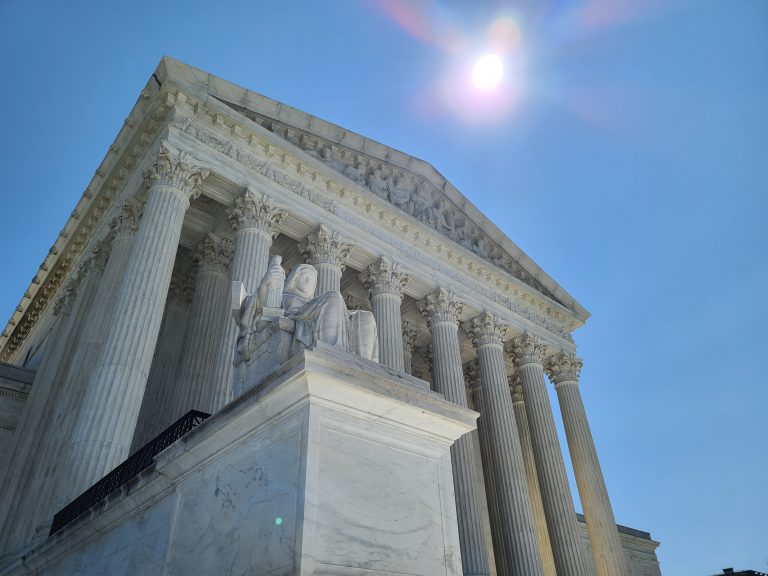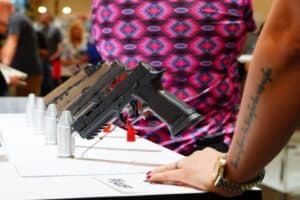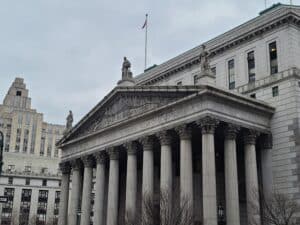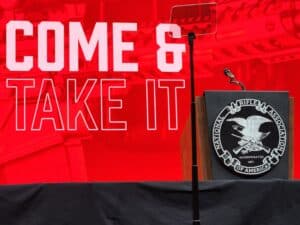New York will have to tell the Supreme Court why it should be able to keep enforcing its latest gun-carry law after the Court struck down the previous one.
Justice Sonya Sotomayor requested the state respond to an emergency request from plaintiffs in one of the Second Circuit cases against its law. Sotomayor oversees the Second Circuit, which recently issued a temporary stay in Antonyuk v. Nigrelli that allows the state to keep enforcing its law as it is litigated. A lower court judge had ruled much of the state’s new law violates the Second Amendment under the test established by the Court earlier this year in New York State Rifle and Pistol Association (NYSRPA) v. Bruen. The plaintiffs want the Supreme Court (SCOTUS) to remove the stay and block the law will the court case plays out.
“Governor Hochul and state lawmakers wasted no time in passing legislation that completely contradicted the Bruen precedent, and we urge the High Court to once again hold the state accountable for violating the Second Amendment rights of their own citizens,” Erich Pratt, senior vice president of plaintiff Gun Owners of America, said in a statement.
Sotomayor could either decide on the motions herself or refer them to the full Court. The outcome will immediately determine whether New York’s latest restrictions will remain enforced. More significantly, if the full Court makes the decision, it will provide the first insight into how it will handle gun cases after Bruen. Whether the Court gets involved in the case at this point and what they decide could signal how aggressive it plans to be when confronted by lawmakers who hope to defy or circumvent Bruen. It could also help further flush out Second Amendment protections, which have received relatively little Supreme Court attention compared to several other amendments.
Judge Glenn Suddaby of the Northern District of New York ruled in Antonyuk that much of New York’s response to SCOTUS striking down its previous strict and subjective gun-carry permitting regime was equally reconstitution. He ruled the Concealed Carry Improvement Act’s (CCIA) subjective “good moral character” standard for issuing permits was similarly unsupported by American tradition and violated the text of the Second Amendment.
“[A]lthough the Court in no way suggests that America lacks a historical tradition of firearm-licensing schemes, it finds (based on the current briefing of the parties) that America lacks a historical tradition of firearm-licensing schemes conferring open-ended discretion on licensing officers,” Judge Suddaby wrote.
He also found portions of the law that required submitting social media activity and information on family members were unconstitutional. The same was true for the state’s attempt to massively expand which locations are off-limits for carrying a gun, even by those with permits. He struck down the ban on carrying in restaurants that serve alcohol, theaters, protests, places of worship, banquet halls or conference centers, parks, areas at airports or clinics before security checkpoints, and public buses. Suddaby also blocked the state’s attempt to make it illegal to carry into privately-owned businesses that are open to the public without explicit permission, a policy that is the exact opposite of every other state.
He also chided the state for failing to present evidence of the historical analogues for many of its modern restrictions, as required under the Bruen ruling. He said his own research into the topic found little evidence there were any historical restrictions dating to the enactment of the Second Amendment that are substantially similar to most of the new regulations in New York’s law. For instance, he noted he could not find any historical laws similar to the social media account review.
“Rather, the Court has mostly found only instances in which this demand was (properly) made of convicted sex offenders while registering for a Sex Offender Registry,” he wrote. “Suffice it to say, the need to regulate convicted sex offenders has not been shown to be analogous to the need to regulate applicants for a concealed-carry license.”
Suddaby also found much of the evidence that New York presented lacking.
“For the sake of brevity, the Court will not expound on why it finds that barring some people from openly carrying rifles on other people’s farms and lands in 19th century America is hardly analogous to barring all license holders from carrying concealed handguns in virtually every commercial building now,” he wrote. “Even if the way the historical and modern regulations burdened one’s Second Amendment right were the same, the State Defendants’ attempt to analogize these six laws to Section 5 of the CCIA would stumble over the second of the Supreme Court’s two ‘central’ metrics: ‘why the regulations burden a law-abiding citizen’s right to armed self defense.'”
He said some of the state’s new restrictions are merely a “thinly disguised version of the sort of impermissible ‘sensitive location’ regulation that the Supreme Court considered and rejected in NYSRPA.” He even argued the ban on carrying at protests was doubly unconstitutional.
“[T]he Court finds itself in a paradox created by a regulation that prevents a license holder from possessing a handgun while gathering with individuals to collectively express their right to protest the regulation by possessing handguns,” he wrote. “Levity aside, the Court does not understand how barring Plaintiff Terrille from carrying concealed at a gun show at a Polish Community Center would further this regulation’s purpose of avoiding the ‘destr[uction] [of] the exercise of [someone else’s] constitutionally-protected rights.’ The Court could be wrong but it will hazard a guess that the Center probably does not lease space to opposing expressive groups at the same time.”
Suddaby ultimately ruled much of the CCIA’s regulations are “unreasonably disproportionate to the burdensomeness of [their] historical analogues,” and the law is filed with “unprecedented constitutional violations.”
Still, the Second Circuit sided with the state when New York appealed the decision and asked for a stay on Suddaby’s ruling. It issued a stay that is set to remain in effect at least until proceedings in the appeal begin. The Second Circuit has issued stays on all three lower court decisions that have found different aspects of New York’s law unconstitutional.
New York has until Tuesday, January 3rd at 4 pm eastern to file its response to the gun-rights plaintiffs’ emergency request.






